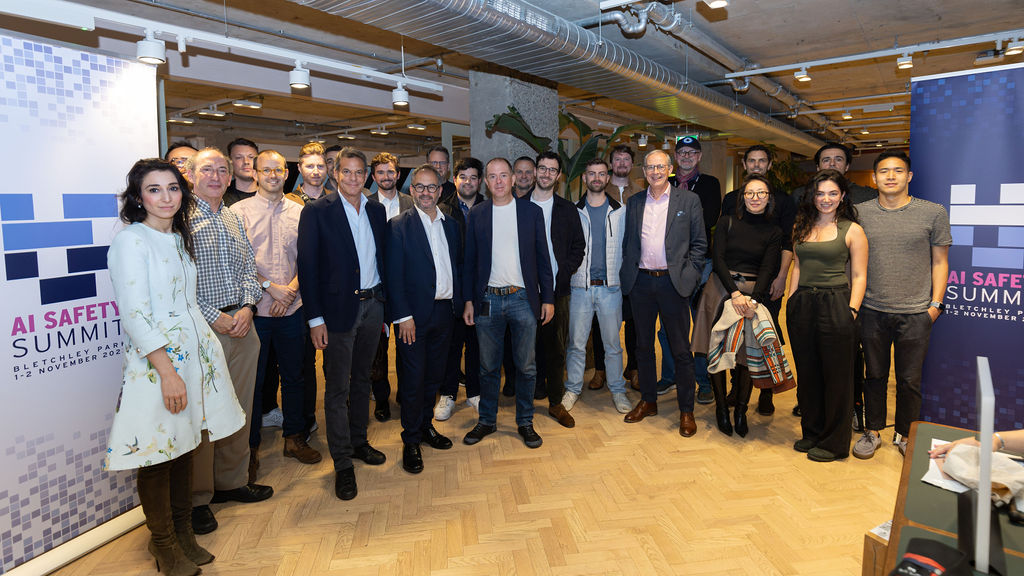The UK has immense opportunity in AI for good – it is time for bold action. AI founders recommend four impactful actions the UK Government should take now.
This is a moment of critical importance, where despite the early dominance of Silicon Valley, the UK has the chance to be a leader in AI, and specifically a global leader in AI for good. The drive will come from the UK’s AI startup and scaleup ecosystem, but it will need to be accompanied by strong leadership from our Government.
We are AI entrepreneurs, and there are many more like us around the UK. We’re already leveraging AI to make the world a better place in a myriad of ways. We are proud to be UK entrepreneurs contributing to our economy and society, and we firmly believe that the UK can lead the world in AI for good.
We seek your partnership in our common purpose to make that a reality. We set out below four practical actions, beyond just policy and regulation, that we believe your Government can and should take immediately to best position the UK for the future and to serve its citizens. We urge you to (1) adopt AI products and services across Government Departments, (2) open our UK datasets in a safe way to maximise their value before it is eroded through inaction, (3) upskill our existing outcomes-focused regulators with AI proficiency, and (4) cultivate the AI startup ecosystem with incentives and support to benefit the UK taxpayer. We are experiencing an unprecedented rate of innovation, so new approaches are required, and bold action must be taken if the UK is to seize this opportunity.
We write to you at a momentous place and time. You’re soon to be at Bletchley Park, where our brilliant British scientists developed Colossus, the world’s first programmable digital electronic computer. In the subsequent 80 years, computers have had a profoundly positive impact on society. It is now widely accepted that AI will have an even more significant impact on the world than computers and in a far shorter time. In the last decade, with the advancements in technologies such as deep neural networks in general and, more recently, large language models, AI has enabled many applications to impact society positively. At the same time, there are risks, which are the subject of your summit. We stand on the threshold of unknowable change. Change that, managed well, can help us to address the world’s most pressing problems, including health, education, the climate emergency, and social inequality. We urge you to start managing the change with these four impactful actions.
1. Lead the world by example – widely adopt AI products and services across Government Departments to drive productivity, expertise and growth. Favour contracts over grants:
The UK Government is in the vanguard of digital delivery but not yet in the use of AI. There is an opportunity for fundamental Government transformation and productivity gains. The UK Government should commit resources to leverage the rich homegrown AI solutions from innovative UK startups and scaleups. This requires committed action, new money invested, and a simplified procurement process for low-risk use cases. This will (a) enhance public services through better user experience and attainment of operational efficiencies, (b) give the public sector greater experience in using AI, which will inform how it regulates it, and (c) deliver impactful business to the UK’s wave of innovative AI SMEs. Further, the Government should incentivise the FTSE250 to follow suit.
Civil servants should be recognised for successfully rolling out trial solutions of AI. Contracts with Government departments, even if they amount only to a trial, are a much better use of the same money and time than grants because they allow the startups to invest in products and understand real users’ needs. Startups can leverage commercial contracts to gain future investment funds in a way that grants can’t be used for – this gives leverage from private sector money.
There are many clear use cases where AI can deliver real value to Government services. For example, if not already in place, prioritising planning applications for case officers based on the probability of approval, immediately paying all of the Government’s suppliers on receipt of an invoice instead of the months of waiting and chasing, auto-approving straightforward benefit claims so that staff have more time to spend on more difficult cases, fraud detection, and predicting electricity demand to achieve savings for customers.
A great starting point would be to launch AI pilots in Government Departments that are keen to develop their AI capability, especially data-rich Departments, and backed by central Government funds. Each application would need a Department sponsor and a private company delivery lead, ideally innovative SMEs. The outputs could be as simple as a parallel run with an existing process to demonstrate a clear ROI. All AI applications should take a human-first approach – designed by humans for human decision-making and with humans always in control. This will help the Government and users realise the benefits of AI whilst minimising the associated risks.
2. Safely open our UK datasets to maximise their value before it is eroded through inaction:
Very large, domain-specific training datasets are critical for AI, and the UK is blessed with unique data assets such as those within the NHS, BBC and Companies House. These datasets can deliver paradigm-shifting innovation, but their value is not being harnessed, and the advantages of their novelty and breadth will gradually be eroded over time. The UK Government should urgently take the lead in creating and providing high-quality, curated, open training datasets, ensuring that privacy, copyright, licensing, bias and ethical issues are addressed. The open banking framework has demonstrated that it is possible and that consumers, research organisations and businesses benefit. These datasets should be made available to UK companies and universities, with the data required to stay onshore, on the condition of open-sourcing the results and with a sharing of value so that it is not all captured by the private sector.
3. Upskill our existing outcomes-focused regulators with AI proficiency, supplement them where necessary, and avoid stifling innovation:
Businesses, especially startups, need regulatory certainty to thrive. The UK has a strong track record of implementing successful outcomes-focused regulation, such as The Financial Conduct Authority (FCA) focusing on the results and impacts of financial activities, aiming to ensure fair and transparent markets and consumer protection.
Like Narrow AI, the most recent advances in AI (defined by the Summit as Frontier AI) will likely also be used as part of a wide range of digital services and products for specific use cases and outcomes. Ensuring regulatory efforts are focused on outcomes (or use cases) gives the regulation the best chance to be close to the end user and to protect the rights of the end user whilst allowing applications to be created in the UK without unnecessary legislative burden. Our recent independence from the EU allows us to excel here, with UK regulations tailored to the requirements and use cases of the UK market, but also promote low-friction trade with key international markets.
As set out in the AI Regulation Whitepaper, we already have world-leading regulators across the appropriate industries, such as finance, healthcare and biosecurity, and those existing regulators should be upskilled by incentivising them to gain experience with AI projects. The same outcomes-focused approach should be used with AI, allowing for a dynamic and adaptable approach to oversight and regulation developed through close partnership with industry and not in isolation. However, regulation typically benefits large incumbent businesses by creating high fixed costs, leading to less competition. The UK should ensure that there is a significant voice for startups in crafting any additional AI regulation.
4. Cultivate the AI startup ecosystem with incentives, support and access to AI talent:
Access to excellent talent is a crucial enabler for startups to scale successfully. Grants and tax incentives, such as the R&D tax rebate, EIS schemes, and various employee share schemes, as well as the visa programmes, have been crucial in attracting investments and talent to the UK startup community in the past decade, which has driven enormous benefits for the UK as a whole. These incentives have clarified that entrepreneurship is a viable career choice, helped establish the UK as a leading startup hub, and driven jobs and innovation.
The Government should prioritise schemes that encourage a thriving startup ecosystem and take concrete steps to support entrepreneurship in the UK and the retention of our leading academics. The Government should ensure that the UK’s AI startup ecosystem has access to the compute resources it needs. The Government should promote the use of transparent, auditable, and secure open-source AI technology wherever possible and support the development of our thriving open-source AI ecosystem in the UK by investing in safety-related research across the AI supply chain.
The visa system must be managed nimbly and pragmatically to address near-term skills gaps in AI-intensive industries, and support provided to build and maintain genuinely world-class AI research and teaching capabilities in our top universities, whilst over the longer term, AI skills must be integrated and prioritised in the school curriculum.
We are willing to help you make these four suggested actions a reality and eagerly await your response.
Yours faithfully,
Angie Ma, Co-Founder, Faculty
Dr Ben Fielding, Co-Founder, Gensyn
Brian Mullins, Founder & CEO, DAQRI & Mind Foundry
Chris Morton, Founder, Lyst
Conrad Wolfram, Founder & CEO, Wolfram Research Europe
Dan Vahdat, Founder & CEO, Huma
Emad Mostaque, Founder & CEO, Stability AI
Heba Bevan OBE, Founder & CEO, UtterBerry LTD
Henry Ajder, Latent Space
Iain Mackie, Co-Founder & CEO, Malt AI
John Cassidy, ex-CEO, CCG.ai
Kathleen Breitman, Co-Founder, Tezos & Coase
Martin McCann, Co-Founder & CEO, Trade Ledger
Matt Arnold, CFO & COO, Mind Foundry
Michael Acton Smith, Co-Founder & CEO, Calm
Nigel Bridges, CEO & Co-Founder, Veracity Trust Network
Professor Niki Trigoni, Founder & CSO, Navenio
Paul Christensen, Co-Founder & CEO, Previse
Paul Harvey, Founder & CEO, Adiona
Peter Sarlin, Co-Founder & CEO, Silo AI
Dr Ross Upton, Founder & CEO, Ultromics
Sachin Dev Dugal, Chief Wizard, builder.ai
Sam Amrani, Founder & CEO, pass_by
Sarah Al-Hussaini, Co-Founder & COO, ultimate.ai
Stephen M. Walker II, Co-Founder & CEO, Klu.ai
Thomas Hoegh, Founder & CEO, Arts Alliance
Tim Levy, Founder & CEO, Twyn
Tom Graham, Co-Founder & CEO, Metaphysic AI
Victoria Kimonides, CEO, Eagle Genomics
William Tunstall-Pedoe, Founder & CEO, Unlikely AI
*The above letter was shared with Prime Minister Rishi Sunak on 28 October 2023, ahead of the UK’s inaugural AI Safety Summit at Bletchley Park.
 All Posts
All Posts


